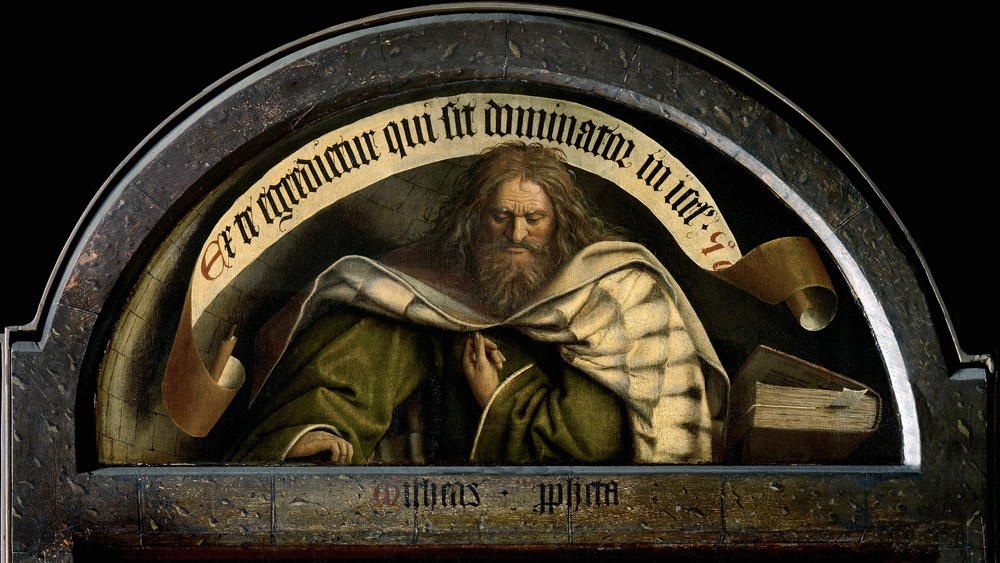 |
| Jan van Eyck: The Prophet Micah, Ghent altar |
Micah is revered among Christians primarily for the opening of chapter 5, which has been interpreted as predicting the birth of Jesus in Bethlehem. That’s arguable – the passage can be read in other ways – and also one of the least interesting things about Micah, in my opinion.
In the Hebrew Bible, the book of Micah sits between Jonah and Nahum. It shares some common ground with both. All three books focus on Israel and Judah’s antagonistic relations with their neighbor Assyria, whose capital Nineveh is used as a synecdoche for that country and its people. Jonah is called to preach repentance to the Ninevites; Nahum portrays their total destruction. Micah addresses the threat that Assyria poses to the cities and towns of the two kingdoms, predicting that they will wreak destruction that will drive the Hebrews to repent their evil ways and ultimately lead to an earthly utopia.
Like Jonah, Micah takes a globalist view of God’s justice. While Micah is a much more traditional book of prophecy than is Jonah – unlike Jonah, Micah speaks to the Hebrew people about their behavior and their need to repent – he is clear that God’s love and mercy extend to all the peoples of the world. However, Micah makes clear that the Hebrews hold fate in their hands.
Micah’s book begins with a frightening set of images of God coming down to Earth to trample the entire planet because of the sins of Israel and Judah (similar imagery is used by Nahum). “Listen, all you peoples, earth and its fullness,” Micah begins. He goes on:
“For the Lord is about to come out from his place.
And go down and tread on earth’s high places,
And the mountains shall melt beneath Him and the valleys split open,
Like wax before the fire, like water pouring down a slope.” (1:3-4)
Universal destruction so far. But then there’s a twist:
“For Jacob’s trespass all this has happenedAnd for the house of Israel’s offenses.” (1:5)
Already in 700 BCE, Jews were being blamed for all the troubles of the world. Some things never change.
 |
As Micha’s first prophecy proceeds, it becomes clear that the sins of the Israelites are to a large degree about corruption within their governmental and religious institutions. Judges demand bribes, preachers and prophets demand payment and offer lies in return, the rich and powerful rob the poor. Widows and their fatherless children are thrown out of their homes. Although “whore’s pay,” money spent on cultic prostitutes who then use it to purchase idols and other riches for their altars, is mentioned, Micah is not primarily about faith in the one God of the Hebrews. It is about how we behave toward each other in society and around the world.
Later on, Micah makes clear what would constitute behavior acceptable to God:
“It was told to you, man,
What is good And what the Lord demands of you –
Only doing justice and loving kindness
And walking humbly with your God.” (6:8)
That last clause is interesting. “Your God.” Does that imply that your god might not be my god? It’s hard to say what the implication is at this point in Micah, but a few chapters earlier, presenting a utopian vision of a world at peace, he makes it clear that achieving this paradisiacal state does not demand that everyone adhere to the same religion:
“For all the peoples shall walk
Each in the name of his god
But we shall walk in the name of the Lord our God forevermore.” (4:5)
The future world at peace envisioned by Micah is duplicated almost exactly in Isaiah chapter 2. The two prophets (assuming 1st Isaiah here – Isaiah appears to have been written by at least three distinct authors) were contemporaries, and may have known each other or certainly of each other, so their content-sharing is not a complete surprise. We don’t have a clue who borrowed from whom. But Isaiah does not repeat the “Each in the name of his god” clause.
Micah and Isaiah position Jerusalem, site of God’s restored temple, as the center of this peaceful world, and as a place where God will be “arbiter to vast nations from far away.” (4:3) But while Isaiah seems to assume that the entire world will follow the Hebrew God, Micah does not require faithfulness to Yahweh of anyone but the Hebrews. Just as God in Jonah did not require conversion of either the sailors or the Ninevites, God in Micah does not mandate the conversion of anyone outside the Hebrew community. He just wants the pervasive maltreatment He observes to stop.
What kind of a god is Yahweh, who does not demand fealty to Himself, but instead demands that we recognize all of his human creation as worthy of decency and respect? One who places love and forgiveness above power and vengeance, it seems. The question arises both in the meaning of Micah’s name, “Who is like God?”, and explicitly in the final chapter of his prophetic book:
“Who is a God like You dismissing crime
And forgiving trespass for the remnant of His estate?”
He does not cling forever to His wrath,
For He desires kindness.” (7:18)
Like Jonah, Micah seems taken aback by God’s determination to forgive, but unlike the other prophet, Micah is not angered by God’s graciousness. Micah sees tolerance and acceptance as key features of the universal utopia he envisions. It may take destruction and repentence to get there, but it awaits us as, in essence, its own reward. Would that today's children of Abraham recall what Micah knew.
